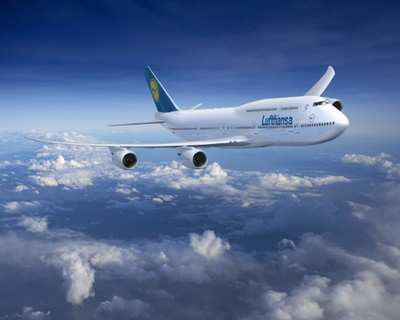Wed, Jan 04, 2012
Airline Says It Will Not Absorb Costs Of EU-ETS, Pax Will
Pay
Lufthansa may be setting the tone for how airlines will handle
the EU's Emissions Trading Scheme (ETS) by telling passengers it
will increase ticket prices to cover the costs of the controversial
plan which went into effect January 1st.

The airline is facing about $169 million in additional operating
overhead to comply with the ETS, according to a report from
Reuters. As the world's second-largest airline, Lufthansa will be
one of the most affected by the new carbon tax.
In a statement posted on its website, Lufthansa said that in
2012, 82 per cent of the necessary certificates will be awarded to
airlines free of charge. Airlines will have to purchase another 15
per cent of the certificates, with 3 per cent being reserved for
new airlines. As these allocations are based on average emissions
for the years 2004 to 2006, the Lufthansa Group will have to buy at
least 35 per cent of the certificates it needs to represent its
growth in recent years. Judging by the average trend in certificate
prices, Lufthansa expects to incur additional expenses of EUR 130m
in 2012. As competition is tough - especially from non-EU
companies, whose operations are only subject to limited emissions
trading rules - Lufthansa will have to pass on the costs via higher
ticket prices, as recommended by the EU. Lufthansa will therefore
include the cost of purchasing the certificates in its existing
fuel surcharge as of the beginning of 2012. However, it has no
immediate plans to increase this surcharge.
“Climate change is a global challenge. This means we also
need a global solution," said Carsten Spohr, Member of the
Executive Board of Deutsche Lufthansa AG, in the statement. "The
incorporation of airlines in the EU Emissions Trading Scheme means
that European operators are now facing additional costs which will
make flying within and via Europe more expensive for passengers. It
will also distort competition and impact on the sustainability of
the aviation industry if it proves impossible to implement with the
competitive neutrality promised by policy makers. However, given
the huge resistance at international level, it is unclear just how
the situation will develop.”
Lufthansa last raised its fuel surcharge for European and
long-haul flights on 15 December 2011 by three to ten euros. In the
future, the surcharge will reflect both the price of oil and the
cost of acquiring emission rights.
The imposition of the carbon tax has caused talks of a looming
trade war between Europe and the U.S., China, Dubai, and
others which do not agree that foreign-flagged carriers should pay
a tax imposed by the European Union.
More News
Circle To Runway (Runway Number) Used by ATC to inform the pilot that he/she must circle to land because the runway in use is other than the runway aligned with the instrument appr>[...]
Aero Linx: National Aviation Safety Foundation (NASF) The National Aviation Safety Foundation is a support group whose objective is to enhance aviation safety through educational p>[...]
At Altitude Of About 250-300 Ft Agl, The Airplane Experienced A Total Loss Of Engine Power On November 6, 2024, at 1600 central standard time, a De Havilland DHC-1, N420TD, was inv>[...]
From 2009 (YouTube Edition): Three Hour Flight Was 'Flawless' -- At Least, Until Mother Nature Intervened For anyone who loves the aviation business, this was a VERY good day. Afte>[...]
Also: AMA Names Tyler Dobbs, More Falcon 9 Ops, Firefly Launch Unsuccessful, Autonomous F-16s The Air Force has begun ground testing a future uncrewed jet design in a milestone tow>[...]
 ANN's Daily Aero-Term (05.05.25): Circle To Runway (Runway Number)
ANN's Daily Aero-Term (05.05.25): Circle To Runway (Runway Number) ANN's Daily Aero-Linx (05.05.25)
ANN's Daily Aero-Linx (05.05.25) NTSB Prelim: De Havilland DHC-1
NTSB Prelim: De Havilland DHC-1 Classic Aero-TV: The Boeing Dreamliner -- Historic First Flight Coverage
Classic Aero-TV: The Boeing Dreamliner -- Historic First Flight Coverage Airborne-NextGen 05.06.25: AF Uncrewed Fighters, Drones v Planes, Joby Crew Test
Airborne-NextGen 05.06.25: AF Uncrewed Fighters, Drones v Planes, Joby Crew Test



